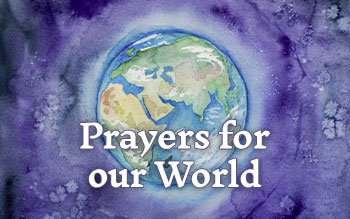Displaying items by tag: Germany
Germany - prayer of the watchmen
A German intercessor writes, ‘God has encouraged us greatly through answers to prayer and has richly blessed prayer conferences. However, the challenging developments in our land in many areas of politics and society (polarisation and hate, the growing influence of gender-mainstreaming, anti-Semitism, declining church attendance, etc), and the rapid turning away from Christian values, cause us to sit up and take notice, and to personally make time to be still before God.’ Throughout September German prayer groups will seek God across the land, believing that ‘if we seek Him with all of our hearts, we will find Him’ (Jeremiah 29:13). Let us join our brothers and sisters and pray for the welfare of German politics and society. God is shaking the nations (Hebrews 12:26,27), so we must not consider everything that is now happening in Germany and across Europe as ‘a bad thing’. There is much for which we can be thankful for in these times.
Germany: Holocaust trial
92-year-old Bruno Dey will be tried in Germany for complicity in mass murder of 5,230 people in the Stutthof Nazi death camp during World War Two. The former guard admitted knowledge of atrocities of murder in gas chambers, where over 65,000 died before Stutthof was liberated on 9 May 1945. This trial is likely to be one of the last against a former Nazi guard. Dr Efraim Zuroff who campaigns for the rights of Holocaust survivors, welcomed the decision to bring Mr Dey to trial. ‘The passage of time in no way diminishes the criminal responsibility of those guilty of aiding and abetting the implementation of the Final Solution,’ he said. There have been two more recent trials of Stutthof guards after 20+ survivors of the camp were located, most of whom are currently residing in Israel.
Germany: no ground troops in Syria
The US is hoping Europe will help in the IS fight, putting pressuring Britain, France and now Germany. Germany has so far deployed surveillance aircraft and other non-combat military support. Chancellor Angela Merkel faced cross-party pressure to reject the US request for German soldiers to serve in Syria. US special Syria representative told German media that Washington wanted Berlin boots on the ground in the north of Syria. The mandate for Germany's participation in Syria runs out on 31 October, meaning that parliament would be called on to decide what to do beyond that date. The German government spokesman, Steffen Seibert said: ‘When I say that the government intends to continue with its ongoing measures in the framework of the anti-IS coalition, then that means no ground troops. For years Germany has been making a significant and internationally acknowledged contribution to fighting IS.’
Germany: Christian home-schooling
A court has granted a Christian couple custody of their children after six years of legal conflict over their right to home-school youngsters. The state kept legal custody of Dirk and Petra Wunderlich's two youngest children after it came to light that the couple were breaking German law by educating their four children at home. Over thirty police officers and social workers raided their home and forcefully removed all the children: only two were later returned, thus preventing the whole family from leaving the country. ‘The right of parents to direct the education of their children is a fundamental right, protected in international law’, said the family’s lawyer at the European Court of Human Rights. ‘We are pleased that the court respected this right.’
Poland: U.S. Agrees To Station 'About 1,000' More Military Personnel
The United States has agreed to station "about 1,000" more military personnel in Poland as the government of the East European country seeks to counter what it perceives as a growing Russian threat.
However, the joint U.S.-Poland declaration signed by President Donald Trump on June 12 stopped short of calling it a permanent presence, potentially easing Kremlin concerns about a larger U.S. military presence near its western border.
Trump earlier in the day said the increase in U.S. forces in Poland could come at the expense of Germany -- whom he criticized for underspending on NATO defense and overspending on Russian gas.
"We would be taking them out of Germany or we would be moving them from another location. It would be no additional troops to Europe," Trump said shortly before reaching the agreement.
The United States has 52,000 troops based in Germany, Trump said. The Pentagon told RFE/RL that the sourcing of the military personnel and other details of the agreement "are still being worked out."
About 4,500 U.S. troops have been stationed in Poland on a rotational basis for the past few years in response to Russia's 2014 annexation of Crimea and Moscow's continued military support for separatists in eastern Ukraine.
NATO separately placed about 1,200 troops in Poland in 2017 as part of its efforts to beef up deterrence against Russia in Eastern Europe and recently agreed to invest $269 million to support U.S. forces in the country.
The 1997 NATO-Russia Founding Act pledges the alliance to carry out its collective defense without the "additional permanent stationing of substantial combat forces." However, the pledge only applied to the "current and foreseeable security environment" at the time.
NATO Secretary-General Jens Stoltenberg said the June 12 U.S.-Polish agreement was "fully in line with NATO's international commitments."
"When the world changes, we have to adapt to make sure that we can continue to protect all allies," Stoltenberg said in the statement, possibly hinting at Russia's actions in Ukraine.
Poland last year proposed spending as much as $2 billion to host a permanent U.S. armored division, which consists of between 10,000 and 15,000 troops, to strengthen its defense against Russia.
Russia, which occupied part of Poland under the tsars, "is again showing its imperial face" by its actions in Ukraine, Polish President Andrzej Duda said at the joint press conference with Trump.
According to the agreement, the U.S. military will expand its "enduring presence" in Poland by about 1,000 personnel "in the near-term." Poland will finance that expanded presence as well as additional military infrastructure, including a U.S. divisional headquarters.
Russia could seek to build up its military presence in the exclave of Kaliningrad in response, former U.S. Army Europe commander Lieutenant General Ben Hodges told RFE/RL. He said the Kremlin could also put more pressure on Belarus to allow its troops into that country. Both Kaliningrad and Belarus border Poland.
Though the U.S. agreement fell far short of Poland's initial request, it is something that "could be scaled" up in the future should developments in Eastern Europe demand it, Eugene Chausovsky, a Eurasia analyst at Stratfor, told RFE/RL.
"This is something that the Polish government can claim as a victory of sorts," he said of the deal.
Poland helped win over Trump's support for the increased military presence by agreeing to purchase U.S. fighter jets as well as liquefied natural gas, Chausovsky said.
Trump confirmed during the joint press conference that Poland will buy nearly three dozen F-35 fighter jets -- worth in excess of $2.5 billion -- as well as an additional $8 billion of liquefied natural gas.
Poland is seeking to wean itself off Russian energy, which accounts for nearly 70 percent of its gas imports. Duda will travel to Houston with Energy Secretary Rick Perry to meet executives of U.S. energy companies during his six-day visit to the United States.
Washington and Warsaw are seeking to halt Russia's plans to build an $11 billion gas pipeline to Germany. The pipeline would make Germany a "hostage of Russia" while also supporting the Russian economy, Trump said.
"We are protecting Germany from Russia, and Russia is getting billions and billions of dollars of money from Germany," Trump said ahead of his meeting with Duda.
He highlighted that Germany was only spending about 1 percent of gross domestic product on defense, below the 2 percent threshold set by NATO members in 2014.
Hodges said moving troops from Germany to Poland would be taken as a sign that the United States was punishing Berlin for its failure to meet defense spending limits.
However, he said, maligning Berlin was not in Washington's interest.
"We have to make sure that we treat Germany as our most important ally. Spending is such a small component of the relationship. You can't put a price tag on" all that Germany does for the United States, said Hodges, who is now with the Center for European Policy Analysis.
Article by Todd Prince
Germany: Jews told not to wear skullcaps
A skullcap, sometimes called a kippah or yarmulke, is a cap worn by some male Jews under religious rules that say their heads should be covered. Commissioner Felix Klein, the German government's top official against anti-semitism, has warned Jewish people not to wear skullcaps in parts of the country because of a rise in anti-Semitic attacks. Mr Klein told the Funke newspaper group, ‘My opinion has unfortunately changed compared with what it used to be. I cannot recommend to Jews that they wear the skullcap at all times everywhere in Germany.’ According to statistics released earlier this month, anti-Semitic incidents were up by 19.6% to 1,799 in 2018, with 89.1% of them involving far-right perpetrators. Israeli President Reuven Rivlin said he was deeply shocked by Mr Klein's words. He added, ‘We will never submit, will never lower our gaze and will never react to anti-semitism with defeatism - and expect and demand our allies act in the same way.’
Austria: Russian video scandal
On 18 May Austria's vice-chancellor Heinz-Christian Strache resigned after German media published a video that purportedly showed him offering government contracts to a woman posing as the niece of a Russian oligarch, in exchange for media coverage and political funding. The scandal drove Austria’s Chancellor Sebastian Kurz to call for snap elections instead of trying to revive his weakened coalition government. ‘Enough is enough,’ Kurz told reporters, while Strache, who leads Austria's far-right Freedom Party, described the incident as a ‘targeted political assassination.’ The video was reportedly just months before Austria's last election, where Strache's party received 26% of the vote and 51 seats. In the wake of the video, Kurz said the abuse of power, taxes and interference in media affairs were among his concerns. Strache vowed to take legal steps to address the video.
Germany: opening to God
Before refugees came, Germans never thought about religion. Germany was a ‘Christian’ country. Lutheran or Catholic was an insignificant part of life. Now that Muslims have come, religion is an issue. Germans are questioning, ‘How am I different from them?’ ‘What do I even believe?’ ‘What does it mean to be a Christian?’ and ‘Who is God?’ Communities are becoming more open now. Even Muslims are becoming disillusioned because of the things being done in the name of Islam, and questioning if they want to be a part of something that does such harm. The Spirit is working in converts to Christianity. Most are authentic heart-transformations, even though some are sceptical and disheartened by occasional fake proclamations of faith. Fake or not, despite the intentions of the heart, God’s Word does not come back void. The gospel is being preached, even though there is still much opposition from sceptical nationals and fearful refugees.
Europe: Huawei and 5G security
President Trump wants Europe to ban Chinese tech giant Huawei from their next-generation 5G information networks, citing security risks (giving China power inside telecommunication networks where they could modify or steal information or conduct undetected espionage). US secretary of state Mike Pompeo warned of consequences for countries that don’t toe Washington’s line on the issue. Nevertheless, Germany may allow Huawei to operate in its 5G network plans, and the UK thinks the security risks of using Huawei resources are manageable. Huawei set out ambitious plans for Europe at a festive evening to mark the beginning of the Chinese New Year. ‘Europe is like a big, lively family. We feel happy to be a part of it, and look forward to growing together with it,’ said a Huawei representative. See
German-Israeli cooperation in Africa
Since 2012, Israel and Germany have worked together on policies to aid the development of African countries. Germany is providing 90% of the financial support, which enables the Israelis to bring their expertise into the latest agricultural developments. Large projects, which Israel cannot carry out alone, will grow with German provision. As Israel was forced within its own land to find solutions for the lack of water in desert areas, Israelis are now blessing many countries in Africa with their knowledge, fulfilling God’s word ‘and you will be a blessing’ (Genesis 12:2).









